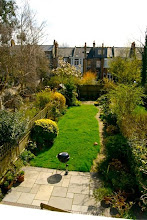
This is one of my favourite ever books. I've loved it ever since I first read it as a teenager, and I love it still. It's a wonderful story -- funny, moving, tender, intelligent -- and brilliantly constructed in the form of a diary, that manages to move effortlessly between the past and present tense (a clever balancing act that Dodie Smith makes look easy, though it's actually a difficult technique to get right). It has an excellent opening sentence -- "I write this sitting in the kitchen sink" -- and an equally pleasing ending, which I won't give away for those of you who haven't yet read it.
One of my most inspiring former editors -- actually, make that a mentor -- gave me a beautiful first edition when my first novel came out; the handwritten name inside the frontispiece is Brownie Heinemann, who I assume was one of the publishing family (Dodie Smith was published by William Heinemann Ltd).
Anyway, I could rhapsodize for hours about 'I Capture The Castle', but here's a little column in the Sunday Telegraph instead.
There are many good reasons to read Dodie Smith’s “I Capture The Castle”: it provides excellent advice about dressing on a budget (dye all your clothes sea-green); how to cope when the man you love falls for your older sister (keep a diary) and your stepmother dances naked in the rain (ditto). Given that most teenagers believe their parents to be mad – and vice versa – the novel also serves as a helpful guide to recognising the fine line between eccentricity and outright insanity.
The 17-year-old narrator, Cassandra Mortmain, lives with her family in a dilapidated castle; the household is sliding into penury, as her father, the author of an unusual book called “Jacob Wrestling”, has suffered from writer’s block for years. After serving three months in prison a decade previously – for brandishing a cake knife at his wife, and hitting a neighbour who was attempting to intervene – Mr Mortmain has become reclusive, veering from silence to occasional violence with little in the way of warning.
Eventually, Cassandra and her younger brother decide that their father is sufficiently unhinged to need psychoanalysis, but given that none is available in rural Suffolk, they lock him up in a nearby tower, in an attempt to start him writing again. “He may be a borderline case,” says Cassandra, “madness and genius are very close to each other, aren’t they? If only we could push him the right way.”
When I first read the novel, I was the same age as Cassandra, and similarly preoccupied by my own father’s eccentricities. He, too, was a writer, and it occurred to me that if only there was a handy tower, it might be the best place for him. Now that I am a writer myself – older than my father was then; and doubtless older than Mr Mortmain – I understand the difficulties of trying to start a new novel, let alone finish one, and how the whole business can drive you crazy. In fact, I often long for a convenient castle in which to retreat, where I could dye my clothes green, commune with nature, wield a cake knife, and possibly – just possibly – get on with my next book.



















